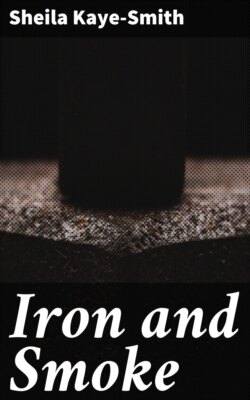Читать книгу Iron and Smoke - Sheila Kaye-Smith - Страница 15
На сайте Литреса книга снята с продажи.
§12
ОглавлениеTable of Contents
By morning the mist had gone, blown over the hills by a sea wind, leaving gardens, fields and hedges globed with moisture, and the air full of a damp, hurrying sweetness. There was hurry, too, and sweetness in the sky, where the clouds flew like doves over high blue windows. For the first time Jenny knew the balmy softness of the South, as the gentle wind stroked her cheeks and hair, and the sunlight fluttered down through the shadows of leaves.
It was Sunday, and Humphrey said he would take her to church. They had not been to church on their honeymoon, but apparently it was a ceremony he never omitted when they were at home. Jenny felt a little apprehensive, for he told her that in church she would see many of the people who were now to be her friends and neighbours, and would have to speak to some of them when service was over.
She put on a dark blue velvet gown, and a velvet hat trimmed with pale blue ribbon and one or two ostrich tips. Then in spite of the warmth she put on the sealskin coat which had been one of her father’s wedding presents. She wanted all the courage of clothes for the occasion, which was made doubly formidable by the fact that she had never before been to morning service in a Church. Her father had not begun that dalliance with Anglicanism which some of the iron-masters considered proper to their social advance. Every fine Sunday morning he and his family had driven into Middlesbrough to worship at the big new Baptist chapel, and Jenny had only the vaguest idea as to what took place in Church at the same time. However, among her wedding presents she had been given a silver-bound Prayer Book, and, clutching this, presented at least the outward appearance of orthodoxy as she walked up the aisle of Heathfield parish church.
The Prayer Book did not help her much to understand the service. It had never occurred to Humphrey Mallard that there were human beings in England who could not follow the Order of Morning Prayer as Appointed to be Read in Churches, so he made no attempt to guide Jenny through its complications, though she pushed the book towards him rather forlornly more than once. However, she was able to find her ease in the hymns—though they seemed rather dull and restrained after the chapel’s more riotous tunes and voices—and the shortness of the sermon brought the otherwise dreary proceedings to an end with a delightful surprise.
She noticed that the church was very old, and its light was subdued with broken colours. It had an old musty smell, and some of the draughtiness of Herringdales. It seemed very dim and quiet after the lusty brightness of the new Baptist Chapel at Middlesbrough. She wondered if Humphrey also said “Old churches are better than new.”
She was glad to be out again in the sunny, windy noon, even though it meant some shy moments when she stood in the churchyard and was greeted by many strange people. Humphrey introduced his bride to the Culpeppers of Tilement Hall, the Luces of Stream House, the Halnakers of Old Mogador, the Sherwoods of Lions Green, to the Rector and his wife, and many others. Her shy, sweet manner pleased him, as he saw it pleased them, and when all the meetings and greetings were over, he handed her into his carriage and took his place beside her feeling more than ever the Squire of Herringdales.
“Well, my sweet, I think you’ve done splendidly with all those people. I could see they liked you. I hope you liked them.”
“Oh, yes, very much, especially that nice Miss Mollet and that nice Mrs Halnaker.”
Humphrey writhed at the coupling.
“They’re two very different kinds of women. It’s odd that you should like them both.”
“I think they’re both extremely nice. Of course you can’t really know people by just shaking hands.”
“Miss Mollet is a silly old maid, who’s somehow had her head turned by the Women’s Rights idea. Mrs Halnaker is a beautiful and intelligent woman.”
“Oh, yes, I could see she was more intelligent than Miss Mollet, even in that short time, and I really liked her the best. And of course she’s very beautiful. I hope I’ll get to know her soon.”
“We must ask her and her husband to dinner with us one night.”
While he spoke he wondered why he did not want Isabel and Jenny to know each other.
“Oh, yes, that would be lovely. But I don’t like him as much as I like her. He seems sort of—of—inferior, somehow.”
“He is inferior. He’s given her a rotten time.”
“Oh, dear, how very sad!”
Humphrey said nothing, and the conversation languished. Jenny was busy with the questioning, pitying thoughts that lay underneath her words, while Humphrey was impatiently asking himself if all her life she would make inadequate remarks beginning with “oh.” He had lost a little of his pride, but before they reached home he had comforted himself with the thought that though she might fall short in private, in public she was supremely satisfying.
